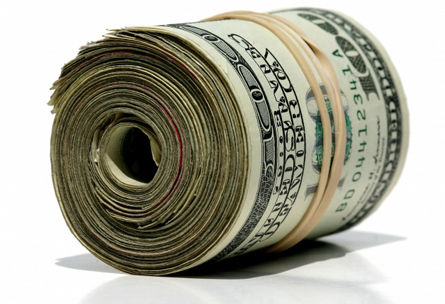双语阅读:中国人用手提箱将现金带出国门
 中国人用手提箱将现金带出国门
中国人用手提箱将现金带出国门 携带大量现金入境未必一定是非法的。当旅行者在加拿大或美国入境时,他们所携现金超过10,000美元的部分必须向海关申报。大多数未申报的现金会被海关临时扣押,并将支付罚款。如果海关人员认为这些现金来自非法的活动,那么携带这些现金入境的人要想让海关把钱退还给他,就有义务证明这些钱是合法的。
美国海关边境保护局(U.S. Customs and Border Protection)的数据显示,从2009年到2011年,美国机场海关人员从中国公民收缴了逾500万美元的未申报现金。这在美国海关缴获的全部未申报现金中占比8.4%,是紧随其后的那个国家的两倍多。
Amid a rush of newly affluent Chinese eager to move money out of China, U.S. and Canadian border officials are seizing large amounts of cash tucked into wallets, purses and suitcases at airports across North America.
Officials at Canada's two busiest airports─Toronto and Vancouver─seized around 12.9 million Canadian dollars ($13.0 million) in undeclared cash from Chinese nationals from April 2011 through early June 2012, according to documents provided to The Wall Street Journal by the Canada Border Services Agency。
The money, most of it returned to the owners, represented 59% of all cash seized at the airports in the period, according to the data. In the U.S., Chinese citizens are the top source of airport cash seizures after Americans。
In June, a Chinese man touched down at Vancouver airport with around $177,500 in cash─mostly in U.S. and Canadian hundred-dollar bills, stuffed in his wallet, pockets and hidden under the lining of his suit case. Clarence Lo, the Canadian Border Service officer who found the cash, said the man told him he was bringing the money in to buy a house or a car. He left the airport with his cash, minus a fine for concealing and not declaring the money。
'He wasn't very happy,' said Mr. Lo。
The financial penalty─at 2,500 Canadian dollars, or about $2,500─was a relatively small price to pay for successfully evading strict foreign-capital controls imposed by Beijing. China restricts private citizens from taking out more than $50,000 per individual per year. While it is hard to enforce these restrictions, Chinese authorities are scrutinizing outgoing private cash amid a broad anticorruption drive and as worry grows over the risks of capital flight。
The money seized at airports represents just a sliver of private Chinese money pouring out, but highlights that Chinese citizens are turning to one of the oldest and simplest methods to evade those controls: taking cash out in a suitcase。
Canada's government has yet to provide historical data, but current and former Canadian officials who have worked closely on the issue of cross-border financial transactions say Chinese are bringing in more cash。
From 2009 to 2011, U.S. airport customs officers seized over $5 million in undeclared cash from Chinese citizens, according to U.S. Customs and Border Protection. That is 8.4% of the total seized and more than double the nearest amount for another nationality。
Transporting large amounts of cash isn't necessarily illegal. Travelers must declare cash over $10,000 when they land in Canada or the U.S. Most undeclared cash is temporarily seized and subject to fines. If customs agents believe the cash comes from illegal activities, the onus is on the traveler to prove otherwise before it is returned。
In China, violators of Beijing's rules on moving out cash are also subject to fines. From 2007 to 2011, China's State Administration of Foreign Exchange levied such fines totaling 1.27 billion yuan ($202 million), according to the most recent data available。
However, among some Canadian law-enforcement officials, there has been reluctance to pass on information to Chinese peers about suspected illegal money flow。
A spokesman for the Border Services Agency declined to say whether it passed on information about cash seizures to Chinese authorities。
'The dilemma for law enforcement is whether sharing of intelligence will create hardship for [Chinese] family members,' said Garry Clement, a former director of the Royal Canadian Mounted Police's money-laundering section. That reluctance makes it harder to assess the legitimacy of Chinese money coming into Canada, he said。
In June, a Chinese anticorruption official told the state-run Xinhua news agency that China would ask other countries to freeze corrupt officials' illicit assets transferred abroad。
A Canadian official said the country's Department of Foreign Affairs and International Trade had no record of such a request。
The Chinese embassies in Ottawa and Washington didn't respond to requests for comment on Chinese nationals bringing cash to Canada. China's State Administration of Foreign Exchange also didn't immediately respond. U.S. customs agencies didn't comment directly on cash seizures from Chinese individuals。
There are many legal and illegal ways of getting cash out of China besides the suitcase, financial-crime experts say. A common method is fraudulently manipulating invoices or other records in order to piggyback personal cash on top of legitimate business transactions。
An informal network of money-transfer middlemen has grown up around moving cash out of China。
Tony Savino, a Vancouver-based real estate agent, said he had a Chinese client who used an international money-wiring firm to gather cash sent from family members, in $10,000 batches, for a condo purchase。
Families can also spread out cash among members traveling by plane. Under the allowed limit, 'a family of six, for example, could move $300,000 each year,' said Inspector Jean Cormier, acting director of a Royal Canadian Mounted Police unit that specializes in money laundering。
Some people go as far as getting a new passport. Mainland investor Bruce Lee said he became a Hong Kong citizen two years ago partly because of the territory's looser currency rules。
In June, Mr. Lee paid $400,000 for an island off the coast of Nova Scotia. To get the cash for the purchase, he wired money from his furniture business in Guangzhou to a business in Hong Kong, and from there to Canada, moves that are legal under Hong Kong law。
Many people simply carry the cash. The $1 million seized from Chinese citizens at Los Angeles international airports over the last three years─an amount that has almost tripled since 2009─represented 17% of all cash seized in the city's airports. Chinese money accounted for the second biggest cash seizures─after funds seized from Americans─at airports in Chicago and Detroit and the third biggest in Houston and San Francisco. In Detroit, cash seized in 2011 from Chinese citizens represented 18% of all cash taken, a ratio that had increased from 5% in 2009.
- 双语研究:小时候快乐的人长大更有钱(图)2012-03-31 10:02
- 双语:“男人感冒”收入钱伯斯词典(图)2011-08-26 15:45
- 双语盘点:与钱有关的英语词汇(图)2010-09-09 14:16
- 双语:调查显示人越有钱睡得越香(图)2010-02-25 11:28
